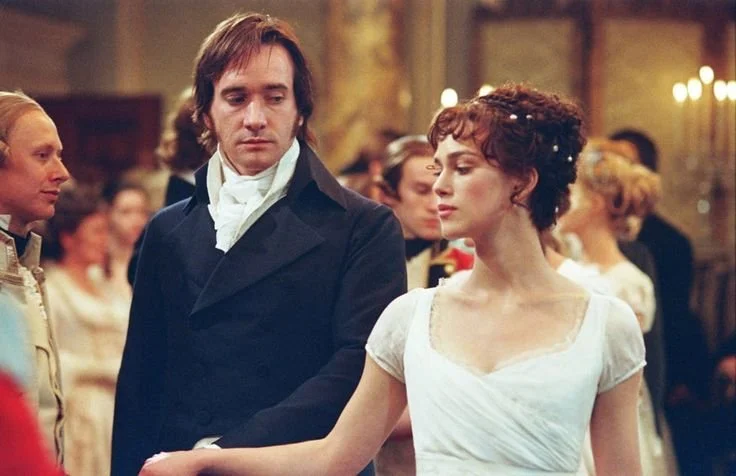Netflix’s ‘Pride and Prejudice’ Already Feels Outdated (and It’s Not Even Out Yet)
By Laurel Sanders
No, the new Pride and Prejudice adaptation isn’t out yet, and yes, I’m already disappointed.
It has been 30 years since the beloved 1995 BBC series starring Jennifer Ehle as Elizabeth Bennet and Colin Firth as Mr. Darcy, and 20 years since Joe Wright’s iconic 2005 film with Keira Knightley and Matthew Macfadyen. The last mainstream adaptation, Pride and Prejudice and Zombies (2016), barely made a cultural ripple. Quite frankly, I’m not even sure many people know it exists. So, by all accounts, we are due for a new version, and for better or worse, Netflix began production on a miniseries in July 2025.
Image Courtesy of Netflix
While little has been announced beyond the cast, I’m already concerned. Because the cast, and I hate to say it, is disappointing.
It’s 2025. We live in a post-Bridgerton world, so, “colorblind” casting seemed like the obvious next step for a Pride and Prejudice reboot. The first adaptation came out in 1940, and every major version since has featured an entirely white cast. Even Bridget Jones’s Diary (set in the early 2000s) didn’t diversify its ensemble. The only outlier was Bride & Prejudice (2004), Gurinder Chadha’s Bollywood-style musical that set the story in modern-day India. Fun, chaotic, and full of color, but not quite the same as a racially diverse Pride and Prejudice set in the 19th century.
That’s what made the new adaptation so promising. But instead, Netflix went safe. Emma Corrin (Lady Chatterley’s Lover, Nosferatu) will play Elizabeth Bennet, and Jack Lowden (Slow Horses, Dunkirk) is Mr. Darcy. Both are talented. Both will do fine. But both have already spent half their careers in period dramas. It’s just predictable.
To be fair, the 2025 cast isn’t completely white. Daryl McCormack (Good Luck to You, Leo Grande) and Sienna Kelly (Adult Material) will play Charles and Caroline Bingley, both Black and BIOPIC actors. That’s something. It shows that diversity was on the table, even if the leads remained white. It feels like the show borrowed Bridgerton’s approach, diverse casting within families, but without acknowledging race as part of the story. (And thank God, because Bridgerton’s “racism was solved by royal marriage” subplot was weird. Deeply weird.)
Still, Bridgerton managed to create a visually diverse world, from main characters to background actors. Netflix’s Pride and Prejudice, by contrast, looks more like an afterthought. I wish they had gone the full Rodgers & Hammerstein’s Cinderella route, with truly color-conscious casting where racial diversity isn’t explained or justified. Think of Brandy as Cinderella and Paolo Montalban as her Filipino prince. Or modern Shakespeare revivals where Lupita Nyong’o, Sandra Oh, and Peter Dinklage can all share the stage because, well, why shouldn’t they?
Still from Pride and Prejudice (2005)
Austen’s work deserves that same treatment. But based on set photos, it seems the Bennets, Darcys, and Lady Catherine are all white. The Bingleys are the only exceptions, which makes their casting feel more like a checkbox than a bold choice. As Jack Lowden joked to the BBC earlier this year, “I quite like the idea of being a ginger Darcy, I think that is really breaking down barriers—one of the great last barriers to be broken down.” Funny, sure, but there has never been a single mainstream adaptation with a Darcy of color. Those barriers are very much still up. And, well, Dev Patel is right there. Literally right over there.
Now, diversity isn’t my only gripe. Let’s talk Wickham.
Louis Partridge (Enola Holmes, The House of Guinness) has been cast as the charmingly villainous George Wickham. I like him—he’s talented, he’s likable—but he’s also 22. And that completely ruins Wickham’s dynamic. Wickham and Darcy are supposed to be contemporaries, near in age, with a shared past. Jack Lowden is 35. Are we really meant to believe this grown man has a long-standing beef with a child?
It also undercuts Lydia’s storyline. Wickham’s seduction of Lydia is supposed to be tragic. Lydia, at 15, is naive and reckless, while Wickham, in his late twenties, manipulates her. It’s supposed to make you uncomfortable. In this version, Rhea Norwood, who plays Lydia, is 24, older than Partridge himself. Sure, makeup and costumes can do a lot, but the emotional weight of that storyline vanishes if Wickham looks like a teenager himself. I wish they had leaned into the discomfort. Cast a real teen as Lydia. Cast an older Wickham. Make the audience squirm, because they should.
Lastly, Olivia Colman. My beloved. I adore her, and she is perfect casting for any Jane Austen adaptation. In the new 2025 series, she will play Mrs. Bennet. Of course, she’ll nail it—she always does. But I can’t help thinking she’d make an even better Lady Catherine de Bourgh. Mrs. Bennet is supposed to be genuinely annoying and foolish, someone her family dismisses until we eventually grow to love her. But Olivia Colman is inherently likable and trustworthy. Lady Catherine, on the other hand, is all arrogance and influence. Casting Colman in that role would have been iconic. Still, this is a minor quibble compared to everything else.
In the end, I’m sure this adaptation will be good. Dolly Alderton is writing the scripts, and she has the perfect sense of British humor for Austen. The series is directed by Euros Lyn, who also helmed Netflix’s Heartstopper. He knows how to tell a romantic, charming story. But I can’t help feeling frustrated that I may have to wait another ten years for a truly exciting Pride and Prejudice adaptation.


